


2019 911 (992)

2019 911 Cabriolet (992)

2020 911 Speedster

2018 911 GT (991 II)

2017 911 Cabriolet (991 II)

2017 911 (991 II)

2017 911 Targa (991 II)
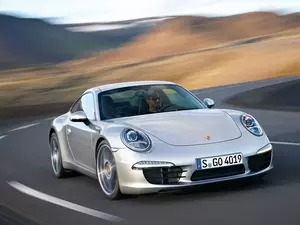
2012 911 (991)

2014 911 GT (991)

2014 911 Targa (991)
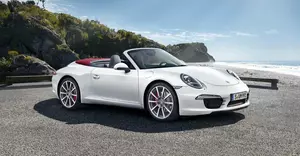
2012 911 Cabriolet (991)

2009 911 GT (997, facelift 2008)
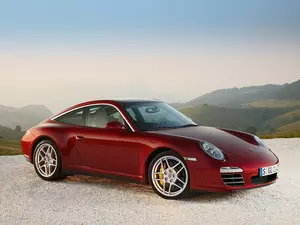
2009 911 Targa (997, facelift 2008)

2009 911 (997, facelift 2008)
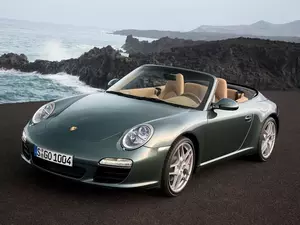
2009 911 Cabriolet (997, facelift 2008)

2007 911 Targa (997)

2005 911 Cabriolet (997)

2007 911 GT (997)
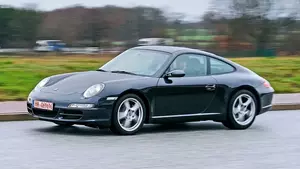
2005 911 (997)

2002 911 GT (996, facelift 2001)

2002 911 Targa (996, facelift 2001)
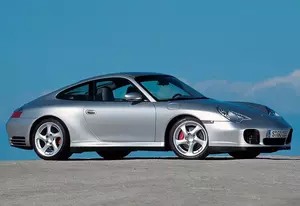
2002 911 (996, facelift 2001)
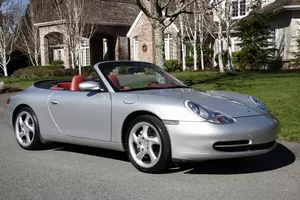
2002 911 Cabriolet (996, facelift 2001)
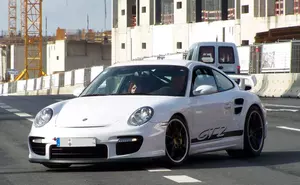
2000 911 GT (996)

1998 911 (996)
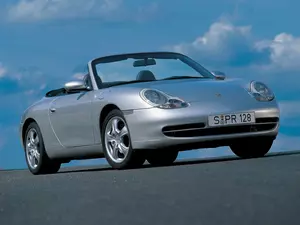
1998 911 Cabriolet (996)
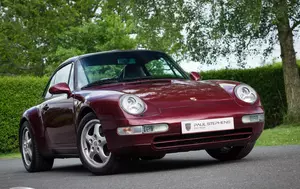
1996 911 Targa (993)

1995 911 Cabriolet (993)

1995 911 (993)
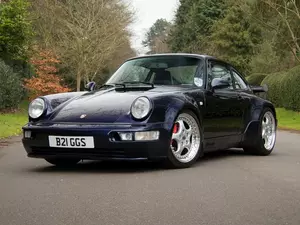
1990 911 (964)
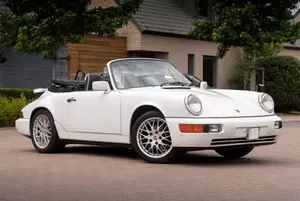
1990 911 Cabriolet (964)
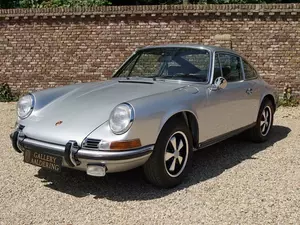
911

| Vehicle | Precise engine size | Difference from world average | Engine size to consumption ratio | Horsepower from 1 L | Engine size to 100 kg of weight |
|---|---|---|---|---|---|
| Carrera S 3.0 |
2.98 L (2981 cc) |
27.1% bigger | 115 cc to 1 mpg | 151 hp from 1 L | 199 cc to 100 kg |
| Carrera 4S 3.0 |
2.98 L (2981 cc) |
27.1% bigger | 115 cc to 1 mpg | 151 hp from 1 L | 186 cc to 100 kg |
| Carrera 3.0 |
2.98 L (2981 cc) |
27.1% bigger | 115 cc to 1 mpg | 129 hp from 1 L | 199 cc to 100 kg |
| Carrera 4 3.0 |
2.98 L (2981 cc) |
27.1% bigger | 115 cc to 1 mpg | 129 hp from 1 L | 186 cc to 100 kg |
| Turbo S 3.8 |
3.75 L (3745 cc) |
59.6% bigger | - | 173 hp from 1 L | 234 cc to 100 kg |
| Vehicle | Carrera S 3.0 |
|---|---|
| Precise engine size | 2.98 L (2981 cc) |
| Difference from world average | 27.1 bigger |
| Engine size to consumption ratio | 115 cc to 1 mpg |
| Horsepower from 1 L | 151 hp from 1 L |
| Engine size to 100 kg of weight | 199 cc to 100 kg |
| Vehicle | Carrera 4S 3.0 |
| Precise engine size | 2.98 L (2981 cc) |
| Difference from world average | 27.1 bigger |
| Engine size to consumption ratio | 115 cc to 1 mpg |
| Horsepower from 1 L | 151 hp from 1 L |
| Engine size to 100 kg of weight | 186 cc to 100 kg |
| Vehicle | Carrera 3.0 |
| Precise engine size | 2.98 L (2981 cc) |
| Difference from world average | 27.1 bigger |
| Engine size to consumption ratio | 115 cc to 1 mpg |
| Horsepower from 1 L | 129 hp from 1 L |
| Engine size to 100 kg of weight | 199 cc to 100 kg |
| Vehicle | Carrera 4 3.0 |
| Precise engine size | 2.98 L (2981 cc) |
| Difference from world average | 27.1 bigger |
| Engine size to consumption ratio | 115 cc to 1 mpg |
| Horsepower from 1 L | 129 hp from 1 L |
| Engine size to 100 kg of weight | 186 cc to 100 kg |
| Vehicle | Turbo S 3.8 |
| Precise engine size | 3.75 L (3745 cc) |
| Difference from world average | 59.6 bigger |
| Engine size to consumption ratio | - |
| Horsepower from 1 L | 173 hp from 1 L |
| Engine size to 100 kg of weight | 234 cc to 100 kg |

| Vehicle | Precise engine size | Difference from world average | Engine size to consumption ratio | Horsepower from 1 L | Engine size to 100 kg of weight |
|---|---|---|---|---|---|
| Carrera S 3.0 |
2.98 L (2981 cc) |
27.1% bigger | 115 cc to 1 mpg | 151 hp from 1 L | 186 cc to 100 kg |
| Carrera 4S 3.0 |
2.98 L (2981 cc) |
27.1% bigger | 115 cc to 1 mpg | 151 hp from 1 L | 186 cc to 100 kg |
| Carrera 3.0 |
2.98 L (2981 cc) |
27.1% bigger | 115 cc to 1 mpg | 129 hp from 1 L | 186 cc to 100 kg |
| Carrera 4 3.0 |
2.98 L (2981 cc) |
27.1% bigger | 115 cc to 1 mpg | 129 hp from 1 L | 186 cc to 100 kg |
| Turbo S 3.8 |
3.75 L (3745 cc) |
59.6% bigger | - | 173 hp from 1 L | 220 cc to 100 kg |
| Vehicle | Carrera S 3.0 |
|---|---|
| Precise engine size | 2.98 L (2981 cc) |
| Difference from world average | 27.1 bigger |
| Engine size to consumption ratio | 115 cc to 1 mpg |
| Horsepower from 1 L | 151 hp from 1 L |
| Engine size to 100 kg of weight | 186 cc to 100 kg |
| Vehicle | Carrera 4S 3.0 |
| Precise engine size | 2.98 L (2981 cc) |
| Difference from world average | 27.1 bigger |
| Engine size to consumption ratio | 115 cc to 1 mpg |
| Horsepower from 1 L | 151 hp from 1 L |
| Engine size to 100 kg of weight | 186 cc to 100 kg |
| Vehicle | Carrera 3.0 |
| Precise engine size | 2.98 L (2981 cc) |
| Difference from world average | 27.1 bigger |
| Engine size to consumption ratio | 115 cc to 1 mpg |
| Horsepower from 1 L | 129 hp from 1 L |
| Engine size to 100 kg of weight | 186 cc to 100 kg |
| Vehicle | Carrera 4 3.0 |
| Precise engine size | 2.98 L (2981 cc) |
| Difference from world average | 27.1 bigger |
| Engine size to consumption ratio | 115 cc to 1 mpg |
| Horsepower from 1 L | 129 hp from 1 L |
| Engine size to 100 kg of weight | 186 cc to 100 kg |
| Vehicle | Turbo S 3.8 |
| Precise engine size | 3.75 L (3745 cc) |
| Difference from world average | 59.6 bigger |
| Engine size to consumption ratio | - |
| Horsepower from 1 L | 173 hp from 1 L |
| Engine size to 100 kg of weight | 220 cc to 100 kg |

| Vehicle | Precise engine size | Difference from world average | Engine size to consumption ratio | Horsepower from 1 L | Engine size to 100 kg of weight |
|---|---|---|---|---|---|
| 4.0 V6 |
4 L (3996 cc) |
70.3% bigger | 235 cc to 1 mpg | 128 hp from 1 L | 266 cc to 100 kg |
| Vehicle | 4.0 V6 |
|---|---|
| Precise engine size | 4 L (3996 cc) |
| Difference from world average | 70.3 bigger |
| Engine size to consumption ratio | 235 cc to 1 mpg |
| Horsepower from 1 L | 128 hp from 1 L |
| Engine size to 100 kg of weight | 266 cc to 100 kg |

| Vehicle | Precise engine size | Difference from world average | Engine size to consumption ratio | Horsepower from 1 L | Engine size to 100 kg of weight |
|---|---|---|---|---|---|
| GT3 4.0 |
4 L (3996 cc) |
70.3% bigger | 210 cc to 1 mpg | 125 hp from 1 L | 285 cc to 100 kg |
| GT2 RS 3.8 |
3.8 L (3800 cc) |
62% bigger | 190 cc to 1 mpg | 184 hp from 1 L | 253 cc to 100 kg |
| GT3 RS 4.0 |
4 L (3996 cc) |
70.3% bigger | 222 cc to 1 mpg | 130 hp from 1 L | 285 cc to 100 kg |
| Vehicle | GT3 4.0 |
|---|---|
| Precise engine size | 4 L (3996 cc) |
| Difference from world average | 70.3 bigger |
| Engine size to consumption ratio | 210 cc to 1 mpg |
| Horsepower from 1 L | 125 hp from 1 L |
| Engine size to 100 kg of weight | 285 cc to 100 kg |
| Vehicle | GT2 RS 3.8 |
| Precise engine size | 3.8 L (3800 cc) |
| Difference from world average | 62 bigger |
| Engine size to consumption ratio | 190 cc to 1 mpg |
| Horsepower from 1 L | 184 hp from 1 L |
| Engine size to 100 kg of weight | 253 cc to 100 kg |
| Vehicle | GT3 RS 4.0 |
| Precise engine size | 4 L (3996 cc) |
| Difference from world average | 70.3 bigger |
| Engine size to consumption ratio | 222 cc to 1 mpg |
| Horsepower from 1 L | 130 hp from 1 L |
| Engine size to 100 kg of weight | 285 cc to 100 kg |

| Vehicle | Precise engine size | Difference from world average | Engine size to consumption ratio | Horsepower from 1 L | Engine size to 100 kg of weight |
|---|---|---|---|---|---|
| Carrera 3.0 |
2.98 L (2981 cc) |
27.1% bigger | 96 cc to 1 mpg | 124 hp from 1 L | 199 cc to 100 kg |
| Carrera S 3.0 |
2.98 L (2981 cc) |
27.1% bigger | 99 cc to 1 mpg | 141 hp from 1 L | 199 cc to 100 kg |
| Turbo S 3.8 |
3.8 L (3800 cc) |
62% bigger | 152 cc to 1 mpg | 153 hp from 1 L | 224 cc to 100 kg |
| Turbo 3.8 |
3.8 L (3800 cc) |
62% bigger | 152 cc to 1 mpg | 142 hp from 1 L | 224 cc to 100 kg |
| Carrera 4 GTS 3.0 |
2.98 L (2981 cc) |
27.1% bigger | 124 cc to 1 mpg | 151 hp from 1 L | 186 cc to 100 kg |
| Carrera GTS 3.0 |
2.98 L (2981 cc) |
27.1% bigger | 106 cc to 1 mpg | 151 hp from 1 L | 199 cc to 100 kg |
| Vehicle | Carrera 3.0 |
|---|---|
| Precise engine size | 2.98 L (2981 cc) |
| Difference from world average | 27.1 bigger |
| Engine size to consumption ratio | 96 cc to 1 mpg |
| Horsepower from 1 L | 124 hp from 1 L |
| Engine size to 100 kg of weight | 199 cc to 100 kg |
| Vehicle | Carrera S 3.0 |
| Precise engine size | 2.98 L (2981 cc) |
| Difference from world average | 27.1 bigger |
| Engine size to consumption ratio | 99 cc to 1 mpg |
| Horsepower from 1 L | 141 hp from 1 L |
| Engine size to 100 kg of weight | 199 cc to 100 kg |
| Vehicle | Turbo S 3.8 |
| Precise engine size | 3.8 L (3800 cc) |
| Difference from world average | 62 bigger |
| Engine size to consumption ratio | 152 cc to 1 mpg |
| Horsepower from 1 L | 153 hp from 1 L |
| Engine size to 100 kg of weight | 224 cc to 100 kg |
| Vehicle | Turbo 3.8 |
| Precise engine size | 3.8 L (3800 cc) |
| Difference from world average | 62 bigger |
| Engine size to consumption ratio | 152 cc to 1 mpg |
| Horsepower from 1 L | 142 hp from 1 L |
| Engine size to 100 kg of weight | 224 cc to 100 kg |
| Vehicle | Carrera 4 GTS 3.0 |
| Precise engine size | 2.98 L (2981 cc) |
| Difference from world average | 27.1 bigger |
| Engine size to consumption ratio | 124 cc to 1 mpg |
| Horsepower from 1 L | 151 hp from 1 L |
| Engine size to 100 kg of weight | 186 cc to 100 kg |
| Vehicle | Carrera GTS 3.0 |
| Precise engine size | 2.98 L (2981 cc) |
| Difference from world average | 27.1 bigger |
| Engine size to consumption ratio | 106 cc to 1 mpg |
| Horsepower from 1 L | 151 hp from 1 L |
| Engine size to 100 kg of weight | 199 cc to 100 kg |

| Vehicle | Precise engine size | Difference from world average | Engine size to consumption ratio | Horsepower from 1 L | Engine size to 100 kg of weight |
|---|---|---|---|---|---|
| Carrera S 3.0 |
2.98 L (2981 cc) |
27.1% bigger | 96 cc to 1 mpg | 141 hp from 1 L | 199 cc to 100 kg |
| Carrera 3.0 |
2.98 L (2981 cc) |
27.1% bigger | 106 cc to 1 mpg | 124 hp from 1 L | 213 cc to 100 kg |
| Turbo S 3.8 |
3.8 L (3800 cc) |
62% bigger | 146 cc to 1 mpg | 153 hp from 1 L | 238 cc to 100 kg |
| Turbo 3.8 |
3.8 L (3800 cc) |
62% bigger | 146 cc to 1 mpg | 142 hp from 1 L | 238 cc to 100 kg |
| Carrera 4S 3.0 |
2.98 L (2981 cc) |
27.1% bigger | 99 cc to 1 mpg | 141 hp from 1 L | 199 cc to 100 kg |
| Carrera GTS 3.0 |
2.98 L (2981 cc) |
27.1% bigger | 106 cc to 1 mpg | 151 hp from 1 L | 199 cc to 100 kg |
| Carrera 4 GTS 3.0 |
2.98 L (2981 cc) |
27.1% bigger | 106 cc to 1 mpg | 151 hp from 1 L | 199 cc to 100 kg |
| Turbo S Exclusive 3.8 |
3.8 L (3800 cc) |
62% bigger | 146 cc to 1 mpg | 160 hp from 1 L | 238 cc to 100 kg |
| Carrera T 3.0 |
2.98 L (2981 cc) |
27.1% bigger | 106 cc to 1 mpg | 124 hp from 1 L | 213 cc to 100 kg |
| Vehicle | Carrera S 3.0 |
|---|---|
| Precise engine size | 2.98 L (2981 cc) |
| Difference from world average | 27.1 bigger |
| Engine size to consumption ratio | 96 cc to 1 mpg |
| Horsepower from 1 L | 141 hp from 1 L |
| Engine size to 100 kg of weight | 199 cc to 100 kg |
| Vehicle | Carrera 3.0 |
| Precise engine size | 2.98 L (2981 cc) |
| Difference from world average | 27.1 bigger |
| Engine size to consumption ratio | 106 cc to 1 mpg |
| Horsepower from 1 L | 124 hp from 1 L |
| Engine size to 100 kg of weight | 213 cc to 100 kg |
| Vehicle | Turbo S 3.8 |
| Precise engine size | 3.8 L (3800 cc) |
| Difference from world average | 62 bigger |
| Engine size to consumption ratio | 146 cc to 1 mpg |
| Horsepower from 1 L | 153 hp from 1 L |
| Engine size to 100 kg of weight | 238 cc to 100 kg |
| Vehicle | Turbo 3.8 |
| Precise engine size | 3.8 L (3800 cc) |
| Difference from world average | 62 bigger |
| Engine size to consumption ratio | 146 cc to 1 mpg |
| Horsepower from 1 L | 142 hp from 1 L |
| Engine size to 100 kg of weight | 238 cc to 100 kg |
| Vehicle | Carrera 4S 3.0 |
| Precise engine size | 2.98 L (2981 cc) |
| Difference from world average | 27.1 bigger |
| Engine size to consumption ratio | 99 cc to 1 mpg |
| Horsepower from 1 L | 141 hp from 1 L |
| Engine size to 100 kg of weight | 199 cc to 100 kg |
| Vehicle | Carrera GTS 3.0 |
| Precise engine size | 2.98 L (2981 cc) |
| Difference from world average | 27.1 bigger |
| Engine size to consumption ratio | 106 cc to 1 mpg |
| Horsepower from 1 L | 151 hp from 1 L |
| Engine size to 100 kg of weight | 199 cc to 100 kg |
| Vehicle | Carrera 4 GTS 3.0 |
| Precise engine size | 2.98 L (2981 cc) |
| Difference from world average | 27.1 bigger |
| Engine size to consumption ratio | 106 cc to 1 mpg |
| Horsepower from 1 L | 151 hp from 1 L |
| Engine size to 100 kg of weight | 199 cc to 100 kg |
| Vehicle | Turbo S Exclusive 3.8 |
| Precise engine size | 3.8 L (3800 cc) |
| Difference from world average | 62 bigger |
| Engine size to consumption ratio | 146 cc to 1 mpg |
| Horsepower from 1 L | 160 hp from 1 L |
| Engine size to 100 kg of weight | 238 cc to 100 kg |
| Vehicle | Carrera T 3.0 |
| Precise engine size | 2.98 L (2981 cc) |
| Difference from world average | 27.1 bigger |
| Engine size to consumption ratio | 106 cc to 1 mpg |
| Horsepower from 1 L | 124 hp from 1 L |
| Engine size to 100 kg of weight | 213 cc to 100 kg |

| Vehicle | Precise engine size | Difference from world average | Engine size to consumption ratio | Horsepower from 1 L | Engine size to 100 kg of weight |
|---|---|---|---|---|---|
| 4 3.0 |
2.98 L (2981 cc) |
27.1% bigger | 99 cc to 1 mpg | 124 hp from 1 L | 186 cc to 100 kg |
| 4S 3.0 |
2.98 L (2981 cc) |
27.1% bigger | 115 cc to 1 mpg | 141 hp from 1 L | 186 cc to 100 kg |
| 4 GTS 3.0 |
2.98 L (2981 cc) |
27.1% bigger | 110 cc to 1 mpg | 151 hp from 1 L | 186 cc to 100 kg |
| Vehicle | 4 3.0 |
|---|---|
| Precise engine size | 2.98 L (2981 cc) |
| Difference from world average | 27.1 bigger |
| Engine size to consumption ratio | 99 cc to 1 mpg |
| Horsepower from 1 L | 124 hp from 1 L |
| Engine size to 100 kg of weight | 186 cc to 100 kg |
| Vehicle | 4S 3.0 |
| Precise engine size | 2.98 L (2981 cc) |
| Difference from world average | 27.1 bigger |
| Engine size to consumption ratio | 115 cc to 1 mpg |
| Horsepower from 1 L | 141 hp from 1 L |
| Engine size to 100 kg of weight | 186 cc to 100 kg |
| Vehicle | 4 GTS 3.0 |
| Precise engine size | 2.98 L (2981 cc) |
| Difference from world average | 27.1 bigger |
| Engine size to consumption ratio | 110 cc to 1 mpg |
| Horsepower from 1 L | 151 hp from 1 L |
| Engine size to 100 kg of weight | 186 cc to 100 kg |

| Vehicle | Precise engine size | Difference from world average | Engine size to consumption ratio | Horsepower from 1 L | Engine size to 100 kg of weight |
|---|---|---|---|---|---|
| Carrera S 3.8 |
3.8 L (3800 cc) |
62% bigger | 141 cc to 1 mpg | 105 hp from 1 L | 271 cc to 100 kg |
| Carrera 4 3.4 |
3.44 L (3436 cc) |
46.5% bigger | 137 cc to 1 mpg | 102 hp from 1 L | 229 cc to 100 kg |
| Carrera 3.4 |
3.44 L (3436 cc) |
46.5% bigger | 118 cc to 1 mpg | 102 hp from 1 L | 245 cc to 100 kg |
| Carrera GTS 3.8 |
3.8 L (3800 cc) |
62% bigger | 141 cc to 1 mpg | 113 hp from 1 L | 271 cc to 100 kg |
| Carrera 4S 3.8 |
3.8 L (3800 cc) |
62% bigger | 158 cc to 1 mpg | 105 hp from 1 L | 253 cc to 100 kg |
| Carrera 4 GTS 3.8 |
3.8 L (3800 cc) |
62% bigger | 146 cc to 1 mpg | 113 hp from 1 L | 253 cc to 100 kg |
| Tutbo S 3.8 |
3.8 L (3800 cc) |
62% bigger | 158 cc to 1 mpg | 147 hp from 1 L | 238 cc to 100 kg |
| R 4.0 |
4 L (3996 cc) |
70.3% bigger | 222 cc to 1 mpg | 125 hp from 1 L | 285 cc to 100 kg |
| Vehicle | Carrera S 3.8 |
|---|---|
| Precise engine size | 3.8 L (3800 cc) |
| Difference from world average | 62 bigger |
| Engine size to consumption ratio | 141 cc to 1 mpg |
| Horsepower from 1 L | 105 hp from 1 L |
| Engine size to 100 kg of weight | 271 cc to 100 kg |
| Vehicle | Carrera 4 3.4 |
| Precise engine size | 3.44 L (3436 cc) |
| Difference from world average | 46.5 bigger |
| Engine size to consumption ratio | 137 cc to 1 mpg |
| Horsepower from 1 L | 102 hp from 1 L |
| Engine size to 100 kg of weight | 229 cc to 100 kg |
| Vehicle | Carrera 3.4 |
| Precise engine size | 3.44 L (3436 cc) |
| Difference from world average | 46.5 bigger |
| Engine size to consumption ratio | 118 cc to 1 mpg |
| Horsepower from 1 L | 102 hp from 1 L |
| Engine size to 100 kg of weight | 245 cc to 100 kg |
| Vehicle | Carrera GTS 3.8 |
| Precise engine size | 3.8 L (3800 cc) |
| Difference from world average | 62 bigger |
| Engine size to consumption ratio | 141 cc to 1 mpg |
| Horsepower from 1 L | 113 hp from 1 L |
| Engine size to 100 kg of weight | 271 cc to 100 kg |
| Vehicle | Carrera 4S 3.8 |
| Precise engine size | 3.8 L (3800 cc) |
| Difference from world average | 62 bigger |
| Engine size to consumption ratio | 158 cc to 1 mpg |
| Horsepower from 1 L | 105 hp from 1 L |
| Engine size to 100 kg of weight | 253 cc to 100 kg |
| Vehicle | Carrera 4 GTS 3.8 |
| Precise engine size | 3.8 L (3800 cc) |
| Difference from world average | 62 bigger |
| Engine size to consumption ratio | 146 cc to 1 mpg |
| Horsepower from 1 L | 113 hp from 1 L |
| Engine size to 100 kg of weight | 253 cc to 100 kg |
| Vehicle | Tutbo S 3.8 |
| Precise engine size | 3.8 L (3800 cc) |
| Difference from world average | 62 bigger |
| Engine size to consumption ratio | 158 cc to 1 mpg |
| Horsepower from 1 L | 147 hp from 1 L |
| Engine size to 100 kg of weight | 238 cc to 100 kg |
| Vehicle | R 4.0 |
| Precise engine size | 4 L (3996 cc) |
| Difference from world average | 70.3 bigger |
| Engine size to consumption ratio | 222 cc to 1 mpg |
| Horsepower from 1 L | 125 hp from 1 L |
| Engine size to 100 kg of weight | 285 cc to 100 kg |

| Vehicle | Precise engine size | Difference from world average | Engine size to consumption ratio | Horsepower from 1 L | Engine size to 100 kg of weight |
|---|---|---|---|---|---|
| GT3 3.8 |
3.8 L (3799 cc) |
61.9% bigger | 200 cc to 1 mpg | 125 hp from 1 L | 271 cc to 100 kg |
| GT3 RS 4.0 |
4 L (3996 cc) |
70.3% bigger | 210 cc to 1 mpg | 125 hp from 1 L | 285 cc to 100 kg |
| Vehicle | GT3 3.8 |
|---|---|
| Precise engine size | 3.8 L (3799 cc) |
| Difference from world average | 61.9 bigger |
| Engine size to consumption ratio | 200 cc to 1 mpg |
| Horsepower from 1 L | 125 hp from 1 L |
| Engine size to 100 kg of weight | 271 cc to 100 kg |
| Vehicle | GT3 RS 4.0 |
| Precise engine size | 4 L (3996 cc) |
| Difference from world average | 70.3 bigger |
| Engine size to consumption ratio | 210 cc to 1 mpg |
| Horsepower from 1 L | 125 hp from 1 L |
| Engine size to 100 kg of weight | 285 cc to 100 kg |

| Vehicle | Precise engine size | Difference from world average | Engine size to consumption ratio | Horsepower from 1 L | Engine size to 100 kg of weight |
|---|---|---|---|---|---|
| 4 3.4 |
3.44 L (3436 cc) |
46.5% bigger | 137 cc to 1 mpg | 102 hp from 1 L | 229 cc to 100 kg |
| 4S 3.8 |
3.8 L (3800 cc) |
62% bigger | 146 cc to 1 mpg | 105 hp from 1 L | 238 cc to 100 kg |
| 4 GTS 3.8 |
3.8 L (3800 cc) |
62% bigger | 146 cc to 1 mpg | 113 hp from 1 L | 238 cc to 100 kg |
| Vehicle | 4 3.4 |
|---|---|
| Precise engine size | 3.44 L (3436 cc) |
| Difference from world average | 46.5 bigger |
| Engine size to consumption ratio | 137 cc to 1 mpg |
| Horsepower from 1 L | 102 hp from 1 L |
| Engine size to 100 kg of weight | 229 cc to 100 kg |
| Vehicle | 4S 3.8 |
| Precise engine size | 3.8 L (3800 cc) |
| Difference from world average | 62 bigger |
| Engine size to consumption ratio | 146 cc to 1 mpg |
| Horsepower from 1 L | 105 hp from 1 L |
| Engine size to 100 kg of weight | 238 cc to 100 kg |
| Vehicle | 4 GTS 3.8 |
| Precise engine size | 3.8 L (3800 cc) |
| Difference from world average | 62 bigger |
| Engine size to consumption ratio | 146 cc to 1 mpg |
| Horsepower from 1 L | 113 hp from 1 L |
| Engine size to 100 kg of weight | 238 cc to 100 kg |

| Vehicle | Precise engine size | Difference from world average | Engine size to consumption ratio | Horsepower from 1 L | Engine size to 100 kg of weight |
|---|---|---|---|---|---|
| Carrera 3.4 |
3.44 L (3436 cc) |
46.5% bigger | 123 cc to 1 mpg | 102 hp from 1 L | 229 cc to 100 kg |
| Carrera S 3.8 |
3.8 L (3800 cc) |
62% bigger | 146 cc to 1 mpg | 105 hp from 1 L | 253 cc to 100 kg |
| Carrera GTS 3.8 |
3.8 L (3800 cc) |
62% bigger | 146 cc to 1 mpg | 113 hp from 1 L | 253 cc to 100 kg |
| Carrera 4 3.4 |
3.44 L (3436 cc) |
46.5% bigger | 127 cc to 1 mpg | 102 hp from 1 L | 229 cc to 100 kg |
| Carrera 4S 3.8 |
3.8 L (3800 cc) |
62% bigger | 158 cc to 1 mpg | 105 hp from 1 L | 253 cc to 100 kg |
| Carrera 4 GTS 3.8 |
3.8 L (3800 cc) |
62% bigger | 158 cc to 1 mpg | 113 hp from 1 L | 253 cc to 100 kg |
| Turbo 3.8 |
3.8 L (3800 cc) |
62% bigger | 158 cc to 1 mpg | 137 hp from 1 L | 224 cc to 100 kg |
| Turbo S 3.8 |
3.8 L (3800 cc) |
62% bigger | 158 cc to 1 mpg | 147 hp from 1 L | 224 cc to 100 kg |
| Vehicle | Carrera 3.4 |
|---|---|
| Precise engine size | 3.44 L (3436 cc) |
| Difference from world average | 46.5 bigger |
| Engine size to consumption ratio | 123 cc to 1 mpg |
| Horsepower from 1 L | 102 hp from 1 L |
| Engine size to 100 kg of weight | 229 cc to 100 kg |
| Vehicle | Carrera S 3.8 |
| Precise engine size | 3.8 L (3800 cc) |
| Difference from world average | 62 bigger |
| Engine size to consumption ratio | 146 cc to 1 mpg |
| Horsepower from 1 L | 105 hp from 1 L |
| Engine size to 100 kg of weight | 253 cc to 100 kg |
| Vehicle | Carrera GTS 3.8 |
| Precise engine size | 3.8 L (3800 cc) |
| Difference from world average | 62 bigger |
| Engine size to consumption ratio | 146 cc to 1 mpg |
| Horsepower from 1 L | 113 hp from 1 L |
| Engine size to 100 kg of weight | 253 cc to 100 kg |
| Vehicle | Carrera 4 3.4 |
| Precise engine size | 3.44 L (3436 cc) |
| Difference from world average | 46.5 bigger |
| Engine size to consumption ratio | 127 cc to 1 mpg |
| Horsepower from 1 L | 102 hp from 1 L |
| Engine size to 100 kg of weight | 229 cc to 100 kg |
| Vehicle | Carrera 4S 3.8 |
| Precise engine size | 3.8 L (3800 cc) |
| Difference from world average | 62 bigger |
| Engine size to consumption ratio | 158 cc to 1 mpg |
| Horsepower from 1 L | 105 hp from 1 L |
| Engine size to 100 kg of weight | 253 cc to 100 kg |
| Vehicle | Carrera 4 GTS 3.8 |
| Precise engine size | 3.8 L (3800 cc) |
| Difference from world average | 62 bigger |
| Engine size to consumption ratio | 158 cc to 1 mpg |
| Horsepower from 1 L | 113 hp from 1 L |
| Engine size to 100 kg of weight | 253 cc to 100 kg |
| Vehicle | Turbo 3.8 |
| Precise engine size | 3.8 L (3800 cc) |
| Difference from world average | 62 bigger |
| Engine size to consumption ratio | 158 cc to 1 mpg |
| Horsepower from 1 L | 137 hp from 1 L |
| Engine size to 100 kg of weight | 224 cc to 100 kg |
| Vehicle | Turbo S 3.8 |
| Precise engine size | 3.8 L (3800 cc) |
| Difference from world average | 62 bigger |
| Engine size to consumption ratio | 158 cc to 1 mpg |
| Horsepower from 1 L | 147 hp from 1 L |
| Engine size to 100 kg of weight | 224 cc to 100 kg |

| Vehicle | Precise engine size | Difference from world average | Engine size to consumption ratio | Horsepower from 1 L | Engine size to 100 kg of weight |
|---|---|---|---|---|---|
| GT3 RS 3.8 |
3.8 L (3797 cc) |
61.8% bigger | 211 cc to 1 mpg | 118 hp from 1 L | 271 cc to 100 kg |
| GT3 3.8 |
3.8 L (3797 cc) |
61.8% bigger | 200 cc to 1 mpg | 114 hp from 1 L | 271 cc to 100 kg |
| GT2 RS 3.6 |
3.6 L (3600 cc) |
53.5% bigger | 180 cc to 1 mpg | 172 hp from 1 L | 257 cc to 100 kg |
| Vehicle | GT3 RS 3.8 |
|---|---|
| Precise engine size | 3.8 L (3797 cc) |
| Difference from world average | 61.8 bigger |
| Engine size to consumption ratio | 211 cc to 1 mpg |
| Horsepower from 1 L | 118 hp from 1 L |
| Engine size to 100 kg of weight | 271 cc to 100 kg |
| Vehicle | GT3 3.8 |
| Precise engine size | 3.8 L (3797 cc) |
| Difference from world average | 61.8 bigger |
| Engine size to consumption ratio | 200 cc to 1 mpg |
| Horsepower from 1 L | 114 hp from 1 L |
| Engine size to 100 kg of weight | 271 cc to 100 kg |
| Vehicle | GT2 RS 3.6 |
| Precise engine size | 3.6 L (3600 cc) |
| Difference from world average | 53.5 bigger |
| Engine size to consumption ratio | 180 cc to 1 mpg |
| Horsepower from 1 L | 172 hp from 1 L |
| Engine size to 100 kg of weight | 257 cc to 100 kg |

| Vehicle | Precise engine size | Difference from world average | Engine size to consumption ratio | Horsepower from 1 L | Engine size to 100 kg of weight |
|---|---|---|---|---|---|
| Targa 4 3.6 |
3.61 L (3614 cc) |
54% bigger | 164 cc to 1 mpg | 96 hp from 1 L | 241 cc to 100 kg |
| Targa 4S 3.8 |
3.8 L (3800 cc) |
62% bigger | 173 cc to 1 mpg | 101 hp from 1 L | 238 cc to 100 kg |
| Vehicle | Targa 4 3.6 |
|---|---|
| Precise engine size | 3.61 L (3614 cc) |
| Difference from world average | 54 bigger |
| Engine size to consumption ratio | 164 cc to 1 mpg |
| Horsepower from 1 L | 96 hp from 1 L |
| Engine size to 100 kg of weight | 241 cc to 100 kg |
| Vehicle | Targa 4S 3.8 |
| Precise engine size | 3.8 L (3800 cc) |
| Difference from world average | 62 bigger |
| Engine size to consumption ratio | 173 cc to 1 mpg |
| Horsepower from 1 L | 101 hp from 1 L |
| Engine size to 100 kg of weight | 238 cc to 100 kg |

| Vehicle | Precise engine size | Difference from world average | Engine size to consumption ratio | Horsepower from 1 L | Engine size to 100 kg of weight |
|---|---|---|---|---|---|
| Carrera 4S 3.8 |
3.8 L (3800 cc) |
62% bigger | 173 cc to 1 mpg | 101 hp from 1 L | 253 cc to 100 kg |
| Carrera S 3.8 |
3.8 L (3800 cc) |
62% bigger | 165 cc to 1 mpg | 101 hp from 1 L | 253 cc to 100 kg |
| Turbo 3.8 |
3.8 L (3800 cc) |
62% bigger | 181 cc to 1 mpg | 132 hp from 1 L | 238 cc to 100 kg |
| Carrera 4 3.6 |
3.61 L (3614 cc) |
54% bigger | 157 cc to 1 mpg | 96 hp from 1 L | 241 cc to 100 kg |
| Turbo S 3.8 |
3.8 L (3800 cc) |
62% bigger | 181 cc to 1 mpg | 139 hp from 1 L | 238 cc to 100 kg |
| Carrera GTS 3.8 |
3.8 L (3800 cc) |
62% bigger | 165 cc to 1 mpg | 107 hp from 1 L | 253 cc to 100 kg |
| Carrera 4 GTS 3.8 |
3.8 L (3800 cc) |
62% bigger | 181 cc to 1 mpg | 107 hp from 1 L | 253 cc to 100 kg |
| Carrera 3.6 |
3.61 L (3614 cc) |
54% bigger | 151 cc to 1 mpg | 96 hp from 1 L | 258 cc to 100 kg |
| Carrera 4S 3.8 |
3.82 L (3824 cc) |
63% bigger | 182 cc to 1 mpg | 101 hp from 1 L | 255 cc to 100 kg |
| Vehicle | Carrera 4S 3.8 |
|---|---|
| Precise engine size | 3.8 L (3800 cc) |
| Difference from world average | 62 bigger |
| Engine size to consumption ratio | 173 cc to 1 mpg |
| Horsepower from 1 L | 101 hp from 1 L |
| Engine size to 100 kg of weight | 253 cc to 100 kg |
| Vehicle | Carrera S 3.8 |
| Precise engine size | 3.8 L (3800 cc) |
| Difference from world average | 62 bigger |
| Engine size to consumption ratio | 165 cc to 1 mpg |
| Horsepower from 1 L | 101 hp from 1 L |
| Engine size to 100 kg of weight | 253 cc to 100 kg |
| Vehicle | Turbo 3.8 |
| Precise engine size | 3.8 L (3800 cc) |
| Difference from world average | 62 bigger |
| Engine size to consumption ratio | 181 cc to 1 mpg |
| Horsepower from 1 L | 132 hp from 1 L |
| Engine size to 100 kg of weight | 238 cc to 100 kg |
| Vehicle | Carrera 4 3.6 |
| Precise engine size | 3.61 L (3614 cc) |
| Difference from world average | 54 bigger |
| Engine size to consumption ratio | 157 cc to 1 mpg |
| Horsepower from 1 L | 96 hp from 1 L |
| Engine size to 100 kg of weight | 241 cc to 100 kg |
| Vehicle | Turbo S 3.8 |
| Precise engine size | 3.8 L (3800 cc) |
| Difference from world average | 62 bigger |
| Engine size to consumption ratio | 181 cc to 1 mpg |
| Horsepower from 1 L | 139 hp from 1 L |
| Engine size to 100 kg of weight | 238 cc to 100 kg |
| Vehicle | Carrera GTS 3.8 |
| Precise engine size | 3.8 L (3800 cc) |
| Difference from world average | 62 bigger |
| Engine size to consumption ratio | 165 cc to 1 mpg |
| Horsepower from 1 L | 107 hp from 1 L |
| Engine size to 100 kg of weight | 253 cc to 100 kg |
| Vehicle | Carrera 4 GTS 3.8 |
| Precise engine size | 3.8 L (3800 cc) |
| Difference from world average | 62 bigger |
| Engine size to consumption ratio | 181 cc to 1 mpg |
| Horsepower from 1 L | 107 hp from 1 L |
| Engine size to 100 kg of weight | 253 cc to 100 kg |
| Vehicle | Carrera 3.6 |
| Precise engine size | 3.61 L (3614 cc) |
| Difference from world average | 54 bigger |
| Engine size to consumption ratio | 151 cc to 1 mpg |
| Horsepower from 1 L | 96 hp from 1 L |
| Engine size to 100 kg of weight | 258 cc to 100 kg |
| Vehicle | Carrera 4S 3.8 |
| Precise engine size | 3.82 L (3824 cc) |
| Difference from world average | 63 bigger |
| Engine size to consumption ratio | 182 cc to 1 mpg |
| Horsepower from 1 L | 101 hp from 1 L |
| Engine size to 100 kg of weight | 255 cc to 100 kg |

| Vehicle | Precise engine size | Difference from world average | Engine size to consumption ratio | Horsepower from 1 L | Engine size to 100 kg of weight |
|---|---|---|---|---|---|
| Carrera 3.6 |
3.61 L (3614 cc) |
54% bigger | 151 cc to 1 mpg | 96 hp from 1 L | 241 cc to 100 kg |
| Turbo 3.8 |
3.8 L (3800 cc) |
62% bigger | 190 cc to 1 mpg | 132 hp from 1 L | 224 cc to 100 kg |
| Carrera S 3.8 |
3.8 L (3800 cc) |
62% bigger | 165 cc to 1 mpg | 101 hp from 1 L | 253 cc to 100 kg |
| Turbo S 3.8 |
3.8 L (3800 cc) |
62% bigger | 181 cc to 1 mpg | 139 hp from 1 L | 224 cc to 100 kg |
| Carrera GTS 3.8 |
3.8 L (3800 cc) |
62% bigger | 165 cc to 1 mpg | 107 hp from 1 L | 253 cc to 100 kg |
| Carrera 4 3.6 |
3.61 L (3614 cc) |
54% bigger | 164 cc to 1 mpg | 96 hp from 1 L | 226 cc to 100 kg |
| Carrera 4S 3.8 |
3.8 L (3800 cc) |
62% bigger | 173 cc to 1 mpg | 101 hp from 1 L | 238 cc to 100 kg |
| Carrera 4 GTS 3.8 |
3.8 L (3800 cc) |
62% bigger | 173 cc to 1 mpg | 107 hp from 1 L | 238 cc to 100 kg |
| Vehicle | Carrera 3.6 |
|---|---|
| Precise engine size | 3.61 L (3614 cc) |
| Difference from world average | 54 bigger |
| Engine size to consumption ratio | 151 cc to 1 mpg |
| Horsepower from 1 L | 96 hp from 1 L |
| Engine size to 100 kg of weight | 241 cc to 100 kg |
| Vehicle | Turbo 3.8 |
| Precise engine size | 3.8 L (3800 cc) |
| Difference from world average | 62 bigger |
| Engine size to consumption ratio | 190 cc to 1 mpg |
| Horsepower from 1 L | 132 hp from 1 L |
| Engine size to 100 kg of weight | 224 cc to 100 kg |
| Vehicle | Carrera S 3.8 |
| Precise engine size | 3.8 L (3800 cc) |
| Difference from world average | 62 bigger |
| Engine size to consumption ratio | 165 cc to 1 mpg |
| Horsepower from 1 L | 101 hp from 1 L |
| Engine size to 100 kg of weight | 253 cc to 100 kg |
| Vehicle | Turbo S 3.8 |
| Precise engine size | 3.8 L (3800 cc) |
| Difference from world average | 62 bigger |
| Engine size to consumption ratio | 181 cc to 1 mpg |
| Horsepower from 1 L | 139 hp from 1 L |
| Engine size to 100 kg of weight | 224 cc to 100 kg |
| Vehicle | Carrera GTS 3.8 |
| Precise engine size | 3.8 L (3800 cc) |
| Difference from world average | 62 bigger |
| Engine size to consumption ratio | 165 cc to 1 mpg |
| Horsepower from 1 L | 107 hp from 1 L |
| Engine size to 100 kg of weight | 253 cc to 100 kg |
| Vehicle | Carrera 4 3.6 |
| Precise engine size | 3.61 L (3614 cc) |
| Difference from world average | 54 bigger |
| Engine size to consumption ratio | 164 cc to 1 mpg |
| Horsepower from 1 L | 96 hp from 1 L |
| Engine size to 100 kg of weight | 226 cc to 100 kg |
| Vehicle | Carrera 4S 3.8 |
| Precise engine size | 3.8 L (3800 cc) |
| Difference from world average | 62 bigger |
| Engine size to consumption ratio | 173 cc to 1 mpg |
| Horsepower from 1 L | 101 hp from 1 L |
| Engine size to 100 kg of weight | 238 cc to 100 kg |
| Vehicle | Carrera 4 GTS 3.8 |
| Precise engine size | 3.8 L (3800 cc) |
| Difference from world average | 62 bigger |
| Engine size to consumption ratio | 173 cc to 1 mpg |
| Horsepower from 1 L | 107 hp from 1 L |
| Engine size to 100 kg of weight | 238 cc to 100 kg |

| Vehicle | Precise engine size | Difference from world average | Engine size to consumption ratio | Horsepower from 1 L | Engine size to 100 kg of weight |
|---|---|---|---|---|---|
| Targa 4 3.6 |
3.6 L (3596 cc) |
53.3% bigger | 180 cc to 1 mpg | 90 hp from 1 L | 225 cc to 100 kg |
| Targa 4S 3.8 |
3.82 L (3824 cc) |
63% bigger | 191 cc to 1 mpg | 93 hp from 1 L | 239 cc to 100 kg |
| Vehicle | Targa 4 3.6 |
|---|---|
| Precise engine size | 3.6 L (3596 cc) |
| Difference from world average | 53.3 bigger |
| Engine size to consumption ratio | 180 cc to 1 mpg |
| Horsepower from 1 L | 90 hp from 1 L |
| Engine size to 100 kg of weight | 225 cc to 100 kg |
| Vehicle | Targa 4S 3.8 |
| Precise engine size | 3.82 L (3824 cc) |
| Difference from world average | 63 bigger |
| Engine size to consumption ratio | 191 cc to 1 mpg |
| Horsepower from 1 L | 93 hp from 1 L |
| Engine size to 100 kg of weight | 239 cc to 100 kg |

| Vehicle | Precise engine size | Difference from world average | Engine size to consumption ratio | Horsepower from 1 L | Engine size to 100 kg of weight |
|---|---|---|---|---|---|
| Carrera S 3.8 |
3.82 L (3824 cc) |
63% bigger | 191 cc to 1 mpg | 93 hp from 1 L | 255 cc to 100 kg |
| Turbo 3.6 |
3.6 L (3600 cc) |
53.5% bigger | 200 cc to 1 mpg | 133 hp from 1 L | 212 cc to 100 kg |
| Carrera 3.6 |
3.6 L (3596 cc) |
53.3% bigger | 171 cc to 1 mpg | 90 hp from 1 L | 240 cc to 100 kg |
| Carrera 4 3.6 |
3.6 L (3596 cc) |
53.3% bigger | 180 cc to 1 mpg | 90 hp from 1 L | 225 cc to 100 kg |
| Carrera 4S 3.8 |
3.82 L (3824 cc) |
63% bigger | 191 cc to 1 mpg | 93 hp from 1 L | 239 cc to 100 kg |
| Vehicle | Carrera S 3.8 |
|---|---|
| Precise engine size | 3.82 L (3824 cc) |
| Difference from world average | 63 bigger |
| Engine size to consumption ratio | 191 cc to 1 mpg |
| Horsepower from 1 L | 93 hp from 1 L |
| Engine size to 100 kg of weight | 255 cc to 100 kg |
| Vehicle | Turbo 3.6 |
| Precise engine size | 3.6 L (3600 cc) |
| Difference from world average | 53.5 bigger |
| Engine size to consumption ratio | 200 cc to 1 mpg |
| Horsepower from 1 L | 133 hp from 1 L |
| Engine size to 100 kg of weight | 212 cc to 100 kg |
| Vehicle | Carrera 3.6 |
| Precise engine size | 3.6 L (3596 cc) |
| Difference from world average | 53.3 bigger |
| Engine size to consumption ratio | 171 cc to 1 mpg |
| Horsepower from 1 L | 90 hp from 1 L |
| Engine size to 100 kg of weight | 240 cc to 100 kg |
| Vehicle | Carrera 4 3.6 |
| Precise engine size | 3.6 L (3596 cc) |
| Difference from world average | 53.3 bigger |
| Engine size to consumption ratio | 180 cc to 1 mpg |
| Horsepower from 1 L | 90 hp from 1 L |
| Engine size to 100 kg of weight | 225 cc to 100 kg |
| Vehicle | Carrera 4S 3.8 |
| Precise engine size | 3.82 L (3824 cc) |
| Difference from world average | 63 bigger |
| Engine size to consumption ratio | 191 cc to 1 mpg |
| Horsepower from 1 L | 93 hp from 1 L |
| Engine size to 100 kg of weight | 239 cc to 100 kg |

| Vehicle | Precise engine size | Difference from world average | Engine size to consumption ratio | Horsepower from 1 L | Engine size to 100 kg of weight |
|---|---|---|---|---|---|
| GT3 RS 3.6 |
3.6 L (3600 cc) |
53.5% bigger | 200 cc to 1 mpg | 115 hp from 1 L | 257 cc to 100 kg |
| GT2 3.6 |
3.6 L (3600 cc) |
53.5% bigger | 189 cc to 1 mpg | 147 hp from 1 L | 257 cc to 100 kg |
| GT3 3.6 |
3.6 L (3600 cc) |
53.5% bigger | 200 cc to 1 mpg | 115 hp from 1 L | 257 cc to 100 kg |
| Vehicle | GT3 RS 3.6 |
|---|---|
| Precise engine size | 3.6 L (3600 cc) |
| Difference from world average | 53.5 bigger |
| Engine size to consumption ratio | 200 cc to 1 mpg |
| Horsepower from 1 L | 115 hp from 1 L |
| Engine size to 100 kg of weight | 257 cc to 100 kg |
| Vehicle | GT2 3.6 |
| Precise engine size | 3.6 L (3600 cc) |
| Difference from world average | 53.5 bigger |
| Engine size to consumption ratio | 189 cc to 1 mpg |
| Horsepower from 1 L | 147 hp from 1 L |
| Engine size to 100 kg of weight | 257 cc to 100 kg |
| Vehicle | GT3 3.6 |
| Precise engine size | 3.6 L (3600 cc) |
| Difference from world average | 53.5 bigger |
| Engine size to consumption ratio | 200 cc to 1 mpg |
| Horsepower from 1 L | 115 hp from 1 L |
| Engine size to 100 kg of weight | 257 cc to 100 kg |

| Vehicle | Precise engine size | Difference from world average | Engine size to consumption ratio | Horsepower from 1 L | Engine size to 100 kg of weight |
|---|---|---|---|---|---|
| Turbo 3.6 |
3.6 L (3600 cc) |
53.5% bigger | 200 cc to 1 mpg | 133 hp from 1 L | 225 cc to 100 kg |
| Carrera 3.6 |
3.6 L (3596 cc) |
53.3% bigger | 171 cc to 1 mpg | 90 hp from 1 L | 257 cc to 100 kg |
| Carrera 4 3.6 |
3.6 L (3596 cc) |
53.3% bigger | 180 cc to 1 mpg | 90 hp from 1 L | 240 cc to 100 kg |
| Carrera 4S 3.8 |
3.82 L (3824 cc) |
63% bigger | 191 cc to 1 mpg | 93 hp from 1 L | 255 cc to 100 kg |
| 3,8 Carrera 4S |
3.82 L (3824 cc) |
63% bigger | 191 cc to 1 mpg | 93 hp from 1 L | 255 cc to 100 kg |
| 3.8 Carrera 4S |
3.82 L (3824 cc) |
63% bigger | 174 cc to 1 mpg | 101 hp from 1 L | 239 cc to 100 kg |
| 3,6 Carrera S |
3.6 L (3596 cc) |
53.3% bigger | 171 cc to 1 mpg | 90 hp from 1 L | 257 cc to 100 kg |
| Carrera S 3.8 |
3.82 L (3824 cc) |
63% bigger | 191 cc to 1 mpg | 93 hp from 1 L | 273 cc to 100 kg |
| 3,8 Carrera S |
3.82 L (3824 cc) |
63% bigger | 201 cc to 1 mpg | 93 hp from 1 L | 255 cc to 100 kg |
| Vehicle | Turbo 3.6 |
|---|---|
| Precise engine size | 3.6 L (3600 cc) |
| Difference from world average | 53.5 bigger |
| Engine size to consumption ratio | 200 cc to 1 mpg |
| Horsepower from 1 L | 133 hp from 1 L |
| Engine size to 100 kg of weight | 225 cc to 100 kg |
| Vehicle | Carrera 3.6 |
| Precise engine size | 3.6 L (3596 cc) |
| Difference from world average | 53.3 bigger |
| Engine size to consumption ratio | 171 cc to 1 mpg |
| Horsepower from 1 L | 90 hp from 1 L |
| Engine size to 100 kg of weight | 257 cc to 100 kg |
| Vehicle | Carrera 4 3.6 |
| Precise engine size | 3.6 L (3596 cc) |
| Difference from world average | 53.3 bigger |
| Engine size to consumption ratio | 180 cc to 1 mpg |
| Horsepower from 1 L | 90 hp from 1 L |
| Engine size to 100 kg of weight | 240 cc to 100 kg |
| Vehicle | Carrera 4S 3.8 |
| Precise engine size | 3.82 L (3824 cc) |
| Difference from world average | 63 bigger |
| Engine size to consumption ratio | 191 cc to 1 mpg |
| Horsepower from 1 L | 93 hp from 1 L |
| Engine size to 100 kg of weight | 255 cc to 100 kg |
| Vehicle | 3,8 Carrera 4S |
| Precise engine size | 3.82 L (3824 cc) |
| Difference from world average | 63 bigger |
| Engine size to consumption ratio | 191 cc to 1 mpg |
| Horsepower from 1 L | 93 hp from 1 L |
| Engine size to 100 kg of weight | 255 cc to 100 kg |
| Vehicle | 3.8 Carrera 4S |
| Precise engine size | 3.82 L (3824 cc) |
| Difference from world average | 63 bigger |
| Engine size to consumption ratio | 174 cc to 1 mpg |
| Horsepower from 1 L | 101 hp from 1 L |
| Engine size to 100 kg of weight | 239 cc to 100 kg |
| Vehicle | 3,6 Carrera S |
| Precise engine size | 3.6 L (3596 cc) |
| Difference from world average | 53.3 bigger |
| Engine size to consumption ratio | 171 cc to 1 mpg |
| Horsepower from 1 L | 90 hp from 1 L |
| Engine size to 100 kg of weight | 257 cc to 100 kg |
| Vehicle | Carrera S 3.8 |
| Precise engine size | 3.82 L (3824 cc) |
| Difference from world average | 63 bigger |
| Engine size to consumption ratio | 191 cc to 1 mpg |
| Horsepower from 1 L | 93 hp from 1 L |
| Engine size to 100 kg of weight | 273 cc to 100 kg |
| Vehicle | 3,8 Carrera S |
| Precise engine size | 3.82 L (3824 cc) |
| Difference from world average | 63 bigger |
| Engine size to consumption ratio | 201 cc to 1 mpg |
| Horsepower from 1 L | 93 hp from 1 L |
| Engine size to 100 kg of weight | 255 cc to 100 kg |

| Vehicle | Precise engine size | Difference from world average | Engine size to consumption ratio | Horsepower from 1 L | Engine size to 100 kg of weight |
|---|---|---|---|---|---|
| GT2 3.6 |
3.6 L (3600 cc) |
53.5% bigger | 200 cc to 1 mpg | 134 hp from 1 L | 257 cc to 100 kg |
| GT3 3.6 |
3.6 L (3600 cc) |
53.5% bigger | - | 106 hp from 1 L | - |
| Vehicle | GT2 3.6 |
|---|---|
| Precise engine size | 3.6 L (3600 cc) |
| Difference from world average | 53.5 bigger |
| Engine size to consumption ratio | 200 cc to 1 mpg |
| Horsepower from 1 L | 134 hp from 1 L |
| Engine size to 100 kg of weight | 257 cc to 100 kg |
| Vehicle | GT3 3.6 |
| Precise engine size | 3.6 L (3600 cc) |
| Difference from world average | 53.5 bigger |
| Engine size to consumption ratio | - |
| Horsepower from 1 L | 106 hp from 1 L |
| Engine size to 100 kg of weight | - |

| Vehicle | Precise engine size | Difference from world average | Engine size to consumption ratio | Horsepower from 1 L | Engine size to 100 kg of weight |
|---|---|---|---|---|---|
| 3.6 |
3.6 L (3596 cc) |
53.3% bigger | 171 cc to 1 mpg | 89 hp from 1 L | 257 cc to 100 kg |
| Vehicle | 3.6 |
|---|---|
| Precise engine size | 3.6 L (3596 cc) |
| Difference from world average | 53.3 bigger |
| Engine size to consumption ratio | 171 cc to 1 mpg |
| Horsepower from 1 L | 89 hp from 1 L |
| Engine size to 100 kg of weight | 257 cc to 100 kg |

| Vehicle | Precise engine size | Difference from world average | Engine size to consumption ratio | Horsepower from 1 L | Engine size to 100 kg of weight |
|---|---|---|---|---|---|
| Carrera 3.6 |
3.6 L (3596 cc) |
53.3% bigger | 171 cc to 1 mpg | 89 hp from 1 L | 257 cc to 100 kg |
| Turbo 3.6 |
3.6 L (3600 cc) |
53.5% bigger | - | 117 hp from 1 L | 240 cc to 100 kg |
| Carrera 4 3.6 |
3.6 L (3596 cc) |
53.3% bigger | 171 cc to 1 mpg | 89 hp from 1 L | 257 cc to 100 kg |
| Carrera 4S 3.6 |
3.6 L (3596 cc) |
53.3% bigger | 171 cc to 1 mpg | 89 hp from 1 L | 240 cc to 100 kg |
| Vehicle | Carrera 3.6 |
|---|---|
| Precise engine size | 3.6 L (3596 cc) |
| Difference from world average | 53.3 bigger |
| Engine size to consumption ratio | 171 cc to 1 mpg |
| Horsepower from 1 L | 89 hp from 1 L |
| Engine size to 100 kg of weight | 257 cc to 100 kg |
| Vehicle | Turbo 3.6 |
| Precise engine size | 3.6 L (3600 cc) |
| Difference from world average | 53.5 bigger |
| Engine size to consumption ratio | - |
| Horsepower from 1 L | 117 hp from 1 L |
| Engine size to 100 kg of weight | 240 cc to 100 kg |
| Vehicle | Carrera 4 3.6 |
| Precise engine size | 3.6 L (3596 cc) |
| Difference from world average | 53.3 bigger |
| Engine size to consumption ratio | 171 cc to 1 mpg |
| Horsepower from 1 L | 89 hp from 1 L |
| Engine size to 100 kg of weight | 257 cc to 100 kg |
| Vehicle | Carrera 4S 3.6 |
| Precise engine size | 3.6 L (3596 cc) |
| Difference from world average | 53.3 bigger |
| Engine size to consumption ratio | 171 cc to 1 mpg |
| Horsepower from 1 L | 89 hp from 1 L |
| Engine size to 100 kg of weight | 240 cc to 100 kg |

| Vehicle | Precise engine size | Difference from world average | Engine size to consumption ratio | Horsepower from 1 L | Engine size to 100 kg of weight |
|---|---|---|---|---|---|
| Carrera 3.6 |
3.6 L (3596 cc) |
53.3% bigger | 171 cc to 1 mpg | 89 hp from 1 L | 240 cc to 100 kg |
| Carrera 4 3.6 |
3.6 L (3596 cc) |
53.3% bigger | 171 cc to 1 mpg | 89 hp from 1 L | 240 cc to 100 kg |
| Carrera 4S 3.6 |
3.6 L (3596 cc) |
53.3% bigger | 189 cc to 1 mpg | 89 hp from 1 L | 225 cc to 100 kg |
| Turbo 3.6 |
3.6 L (3600 cc) |
53.5% bigger | - | 117 hp from 1 L | - |
| Vehicle | Carrera 3.6 |
|---|---|
| Precise engine size | 3.6 L (3596 cc) |
| Difference from world average | 53.3 bigger |
| Engine size to consumption ratio | 171 cc to 1 mpg |
| Horsepower from 1 L | 89 hp from 1 L |
| Engine size to 100 kg of weight | 240 cc to 100 kg |
| Vehicle | Carrera 4 3.6 |
| Precise engine size | 3.6 L (3596 cc) |
| Difference from world average | 53.3 bigger |
| Engine size to consumption ratio | 171 cc to 1 mpg |
| Horsepower from 1 L | 89 hp from 1 L |
| Engine size to 100 kg of weight | 240 cc to 100 kg |
| Vehicle | Carrera 4S 3.6 |
| Precise engine size | 3.6 L (3596 cc) |
| Difference from world average | 53.3 bigger |
| Engine size to consumption ratio | 189 cc to 1 mpg |
| Horsepower from 1 L | 89 hp from 1 L |
| Engine size to 100 kg of weight | 225 cc to 100 kg |
| Vehicle | Turbo 3.6 |
| Precise engine size | 3.6 L (3600 cc) |
| Difference from world average | 53.5 bigger |
| Engine size to consumption ratio | - |
| Horsepower from 1 L | 117 hp from 1 L |
| Engine size to 100 kg of weight | - |

| Vehicle | Precise engine size | Difference from world average | Engine size to consumption ratio | Horsepower from 1 L | Engine size to 100 kg of weight |
|---|---|---|---|---|---|
| GT3 3.6 |
3.6 L (3600 cc) |
53.5% bigger | 200 cc to 1 mpg | 100 hp from 1 L | 257 cc to 100 kg |
| Vehicle | GT3 3.6 |
|---|---|
| Precise engine size | 3.6 L (3600 cc) |
| Difference from world average | 53.5 bigger |
| Engine size to consumption ratio | 200 cc to 1 mpg |
| Horsepower from 1 L | 100 hp from 1 L |
| Engine size to 100 kg of weight | 257 cc to 100 kg |

| Vehicle | Precise engine size | Difference from world average | Engine size to consumption ratio | Horsepower from 1 L | Engine size to 100 kg of weight |
|---|---|---|---|---|---|
| Carrera 4 3.4 |
3.39 L (3387 cc) |
44.4% bigger | - | 88 hp from 1 L | 242 cc to 100 kg |
| Carrera 3.4 |
3.39 L (3387 cc) |
44.4% bigger | - | 88 hp from 1 L | 261 cc to 100 kg |
| Vehicle | Carrera 4 3.4 |
|---|---|
| Precise engine size | 3.39 L (3387 cc) |
| Difference from world average | 44.4 bigger |
| Engine size to consumption ratio | - |
| Horsepower from 1 L | 88 hp from 1 L |
| Engine size to 100 kg of weight | 242 cc to 100 kg |
| Vehicle | Carrera 3.4 |
| Precise engine size | 3.39 L (3387 cc) |
| Difference from world average | 44.4 bigger |
| Engine size to consumption ratio | - |
| Horsepower from 1 L | 88 hp from 1 L |
| Engine size to 100 kg of weight | 261 cc to 100 kg |

| Vehicle | Precise engine size | Difference from world average | Engine size to consumption ratio | Horsepower from 1 L | Engine size to 100 kg of weight |
|---|---|---|---|---|---|
| Carrera 3.4 |
3.39 L (3387 cc) |
44.4% bigger | - | 88 hp from 1 L | 242 cc to 100 kg |
| Carrera 4 3.4 |
3.39 L (3387 cc) |
44.4% bigger | 169 cc to 1 mpg | 88 hp from 1 L | 226 cc to 100 kg |
| Vehicle | Carrera 3.4 |
|---|---|
| Precise engine size | 3.39 L (3387 cc) |
| Difference from world average | 44.4 bigger |
| Engine size to consumption ratio | - |
| Horsepower from 1 L | 88 hp from 1 L |
| Engine size to 100 kg of weight | 242 cc to 100 kg |
| Vehicle | Carrera 4 3.4 |
| Precise engine size | 3.39 L (3387 cc) |
| Difference from world average | 44.4 bigger |
| Engine size to consumption ratio | 169 cc to 1 mpg |
| Horsepower from 1 L | 88 hp from 1 L |
| Engine size to 100 kg of weight | 226 cc to 100 kg |

| Vehicle | Precise engine size | Difference from world average | Engine size to consumption ratio | Horsepower from 1 L | Engine size to 100 kg of weight |
|---|---|---|---|---|---|
| 3.6 |
3.6 L (3600 cc) |
53.5% bigger | 189 cc to 1 mpg | 79 hp from 1 L | 257 cc to 100 kg |
| Vehicle | 3.6 |
|---|---|
| Precise engine size | 3.6 L (3600 cc) |
| Difference from world average | 53.5 bigger |
| Engine size to consumption ratio | 189 cc to 1 mpg |
| Horsepower from 1 L | 79 hp from 1 L |
| Engine size to 100 kg of weight | 257 cc to 100 kg |

| Vehicle | Precise engine size | Difference from world average | Engine size to consumption ratio | Horsepower from 1 L | Engine size to 100 kg of weight |
|---|---|---|---|---|---|
| Carrera 3.6 |
3.6 L (3600 cc) |
53.5% bigger | 189 cc to 1 mpg | 79 hp from 1 L | 257 cc to 100 kg |
| Carrera 4 3.6 |
3.6 L (3600 cc) |
53.5% bigger | - | 76 hp from 1 L | - |
| Turbo 3.6 |
3.6 L (3600 cc) |
53.5% bigger | - | 101 hp from 1 L | - |
| Vehicle | Carrera 3.6 |
|---|---|
| Precise engine size | 3.6 L (3600 cc) |
| Difference from world average | 53.5 bigger |
| Engine size to consumption ratio | 189 cc to 1 mpg |
| Horsepower from 1 L | 79 hp from 1 L |
| Engine size to 100 kg of weight | 257 cc to 100 kg |
| Vehicle | Carrera 4 3.6 |
| Precise engine size | 3.6 L (3600 cc) |
| Difference from world average | 53.5 bigger |
| Engine size to consumption ratio | - |
| Horsepower from 1 L | 76 hp from 1 L |
| Engine size to 100 kg of weight | - |
| Vehicle | Turbo 3.6 |
| Precise engine size | 3.6 L (3600 cc) |
| Difference from world average | 53.5 bigger |
| Engine size to consumption ratio | - |
| Horsepower from 1 L | 101 hp from 1 L |
| Engine size to 100 kg of weight | - |

| Vehicle | Precise engine size | Difference from world average | Engine size to consumption ratio | Horsepower from 1 L | Engine size to 100 kg of weight |
|---|---|---|---|---|---|
| Carrera 3.6 |
3.6 L (3600 cc) |
53.5% bigger | - | 76 hp from 1 L | 257 cc to 100 kg |
| Carrera 4S 3.6 |
3.6 L (3600 cc) |
53.5% bigger | 200 cc to 1 mpg | 79 hp from 1 L | 240 cc to 100 kg |
| Turbo GT 3.6 |
3.6 L (3600 cc) |
53.5% bigger | - | 119 hp from 1 L | 277 cc to 100 kg |
| Carrera 4 3.6 |
3.6 L (3600 cc) |
53.5% bigger | 189 cc to 1 mpg | 79 hp from 1 L | 257 cc to 100 kg |
| Turbo 3.6 |
3.6 L (3600 cc) |
53.5% bigger | 240 cc to 1 mpg | 113 hp from 1 L | 240 cc to 100 kg |
| Carrera RS 3.8 |
3.75 L (3746 cc) |
59.7% bigger | 197 cc to 1 mpg | 80 hp from 1 L | 288 cc to 100 kg |
| Vehicle | Carrera 3.6 |
|---|---|
| Precise engine size | 3.6 L (3600 cc) |
| Difference from world average | 53.5 bigger |
| Engine size to consumption ratio | - |
| Horsepower from 1 L | 76 hp from 1 L |
| Engine size to 100 kg of weight | 257 cc to 100 kg |
| Vehicle | Carrera 4S 3.6 |
| Precise engine size | 3.6 L (3600 cc) |
| Difference from world average | 53.5 bigger |
| Engine size to consumption ratio | 200 cc to 1 mpg |
| Horsepower from 1 L | 79 hp from 1 L |
| Engine size to 100 kg of weight | 240 cc to 100 kg |
| Vehicle | Turbo GT 3.6 |
| Precise engine size | 3.6 L (3600 cc) |
| Difference from world average | 53.5 bigger |
| Engine size to consumption ratio | - |
| Horsepower from 1 L | 119 hp from 1 L |
| Engine size to 100 kg of weight | 277 cc to 100 kg |
| Vehicle | Carrera 4 3.6 |
| Precise engine size | 3.6 L (3600 cc) |
| Difference from world average | 53.5 bigger |
| Engine size to consumption ratio | 189 cc to 1 mpg |
| Horsepower from 1 L | 79 hp from 1 L |
| Engine size to 100 kg of weight | 257 cc to 100 kg |
| Vehicle | Turbo 3.6 |
| Precise engine size | 3.6 L (3600 cc) |
| Difference from world average | 53.5 bigger |
| Engine size to consumption ratio | 240 cc to 1 mpg |
| Horsepower from 1 L | 113 hp from 1 L |
| Engine size to 100 kg of weight | 240 cc to 100 kg |
| Vehicle | Carrera RS 3.8 |
| Precise engine size | 3.75 L (3746 cc) |
| Difference from world average | 59.7 bigger |
| Engine size to consumption ratio | 197 cc to 1 mpg |
| Horsepower from 1 L | 80 hp from 1 L |
| Engine size to 100 kg of weight | 288 cc to 100 kg |

| Vehicle | Precise engine size | Difference from world average | Engine size to consumption ratio | Horsepower from 1 L | Engine size to 100 kg of weight |
|---|---|---|---|---|---|
| Turbo S 3.6 |
3.6 L (3600 cc) |
53.5% bigger | - | 107 hp from 1 L | - |
| Carrera 2 3.6 |
3.6 L (3600 cc) |
53.5% bigger | - | 69 hp from 1 L | 257 cc to 100 kg |
| Turbo S 3.3 |
3.3 L (3299 cc) |
40.6% bigger | - | 115 hp from 1 L | - |
| Carrera RS 3.6 |
3.6 L (3600 cc) |
53.5% bigger | - | 72 hp from 1 L | 300 cc to 100 kg |
| Turbo 3.3 |
3.3 L (3299 cc) |
40.6% bigger | - | 97 hp from 1 L | 220 cc to 100 kg |
| Carrera 4 3.6 |
3.6 L (3600 cc) |
53.5% bigger | - | 69 hp from 1 L | 240 cc to 100 kg |
| Turbo 3.6 |
3.6 L (3600 cc) |
53.5% bigger | 157 cc to 1 mpg | 100 hp from 1 L | - |
| Vehicle | Turbo S 3.6 |
|---|---|
| Precise engine size | 3.6 L (3600 cc) |
| Difference from world average | 53.5 bigger |
| Engine size to consumption ratio | - |
| Horsepower from 1 L | 107 hp from 1 L |
| Engine size to 100 kg of weight | - |
| Vehicle | Carrera 2 3.6 |
| Precise engine size | 3.6 L (3600 cc) |
| Difference from world average | 53.5 bigger |
| Engine size to consumption ratio | - |
| Horsepower from 1 L | 69 hp from 1 L |
| Engine size to 100 kg of weight | 257 cc to 100 kg |
| Vehicle | Turbo S 3.3 |
| Precise engine size | 3.3 L (3299 cc) |
| Difference from world average | 40.6 bigger |
| Engine size to consumption ratio | - |
| Horsepower from 1 L | 115 hp from 1 L |
| Engine size to 100 kg of weight | - |
| Vehicle | Carrera RS 3.6 |
| Precise engine size | 3.6 L (3600 cc) |
| Difference from world average | 53.5 bigger |
| Engine size to consumption ratio | - |
| Horsepower from 1 L | 72 hp from 1 L |
| Engine size to 100 kg of weight | 300 cc to 100 kg |
| Vehicle | Turbo 3.3 |
| Precise engine size | 3.3 L (3299 cc) |
| Difference from world average | 40.6 bigger |
| Engine size to consumption ratio | - |
| Horsepower from 1 L | 97 hp from 1 L |
| Engine size to 100 kg of weight | 220 cc to 100 kg |
| Vehicle | Carrera 4 3.6 |
| Precise engine size | 3.6 L (3600 cc) |
| Difference from world average | 53.5 bigger |
| Engine size to consumption ratio | - |
| Horsepower from 1 L | 69 hp from 1 L |
| Engine size to 100 kg of weight | 240 cc to 100 kg |
| Vehicle | Turbo 3.6 |
| Precise engine size | 3.6 L (3600 cc) |
| Difference from world average | 53.5 bigger |
| Engine size to consumption ratio | 157 cc to 1 mpg |
| Horsepower from 1 L | 100 hp from 1 L |
| Engine size to 100 kg of weight | - |

| Vehicle | Precise engine size | Difference from world average | Engine size to consumption ratio | Horsepower from 1 L | Engine size to 100 kg of weight |
|---|---|---|---|---|---|
| Carrera 3.6 |
3.6 L (3600 cc) |
53.5% bigger | 150 cc to 1 mpg | 69 hp from 1 L | - |
| Carrera 4 3.6 |
3.6 L (3600 cc) |
53.5% bigger | 144 cc to 1 mpg | 69 hp from 1 L | - |
| Vehicle | Carrera 3.6 |
|---|---|
| Precise engine size | 3.6 L (3600 cc) |
| Difference from world average | 53.5 bigger |
| Engine size to consumption ratio | 150 cc to 1 mpg |
| Horsepower from 1 L | 69 hp from 1 L |
| Engine size to 100 kg of weight | - |
| Vehicle | Carrera 4 3.6 |
| Precise engine size | 3.6 L (3600 cc) |
| Difference from world average | 53.5 bigger |
| Engine size to consumption ratio | 144 cc to 1 mpg |
| Horsepower from 1 L | 69 hp from 1 L |
| Engine size to 100 kg of weight | - |

| Vehicle | Precise engine size | Difference from world average | Engine size to consumption ratio | Horsepower from 1 L | Engine size to 100 kg of weight |
|---|---|---|---|---|---|
| 2.3 S |
2.34 L (2341 cc) |
0.2% smaller | - | 81 hp from 1 L | 213 cc to 100 kg |
| 2.0 S |
1.99 L (1991 cc) |
15.1% smaller | 83 cc to 1 mpg | 85 hp from 1 L | 199 cc to 100 kg |
| 2.3 E |
2.34 L (2341 cc) |
0.2% smaller | - | 71 hp from 1 L | 213 cc to 100 kg |
| 2.0 E |
1.99 L (1991 cc) |
15.1% smaller | 83 cc to 1 mpg | 70 hp from 1 L | 199 cc to 100 kg |
| 2.0 T |
1.99 L (1991 cc) |
15.1% smaller | 77 cc to 1 mpg | 55 hp from 1 L | 199 cc to 100 kg |
| 2.0 |
1.99 L (1991 cc) |
15.1% smaller | - | 65 hp from 1 L | 181 cc to 100 kg |
| 2.0 L |
1.99 L (1991 cc) |
15.1% smaller | - | 65 hp from 1 L | - |
| Vehicle | 2.3 S |
|---|---|
| Precise engine size | 2.34 L (2341 cc) |
| Difference from world average | 0.2 smaller |
| Engine size to consumption ratio | - |
| Horsepower from 1 L | 81 hp from 1 L |
| Engine size to 100 kg of weight | 213 cc to 100 kg |
| Vehicle | 2.0 S |
| Precise engine size | 1.99 L (1991 cc) |
| Difference from world average | 15.1 smaller |
| Engine size to consumption ratio | 83 cc to 1 mpg |
| Horsepower from 1 L | 85 hp from 1 L |
| Engine size to 100 kg of weight | 199 cc to 100 kg |
| Vehicle | 2.3 E |
| Precise engine size | 2.34 L (2341 cc) |
| Difference from world average | 0.2 smaller |
| Engine size to consumption ratio | - |
| Horsepower from 1 L | 71 hp from 1 L |
| Engine size to 100 kg of weight | 213 cc to 100 kg |
| Vehicle | 2.0 E |
| Precise engine size | 1.99 L (1991 cc) |
| Difference from world average | 15.1 smaller |
| Engine size to consumption ratio | 83 cc to 1 mpg |
| Horsepower from 1 L | 70 hp from 1 L |
| Engine size to 100 kg of weight | 199 cc to 100 kg |
| Vehicle | 2.0 T |
| Precise engine size | 1.99 L (1991 cc) |
| Difference from world average | 15.1 smaller |
| Engine size to consumption ratio | 77 cc to 1 mpg |
| Horsepower from 1 L | 55 hp from 1 L |
| Engine size to 100 kg of weight | 199 cc to 100 kg |
| Vehicle | 2.0 |
| Precise engine size | 1.99 L (1991 cc) |
| Difference from world average | 15.1 smaller |
| Engine size to consumption ratio | - |
| Horsepower from 1 L | 65 hp from 1 L |
| Engine size to 100 kg of weight | 181 cc to 100 kg |
| Vehicle | 2.0 L |
| Precise engine size | 1.99 L (1991 cc) |
| Difference from world average | 15.1 smaller |
| Engine size to consumption ratio | - |
| Horsepower from 1 L | 65 hp from 1 L |
| Engine size to 100 kg of weight | - |